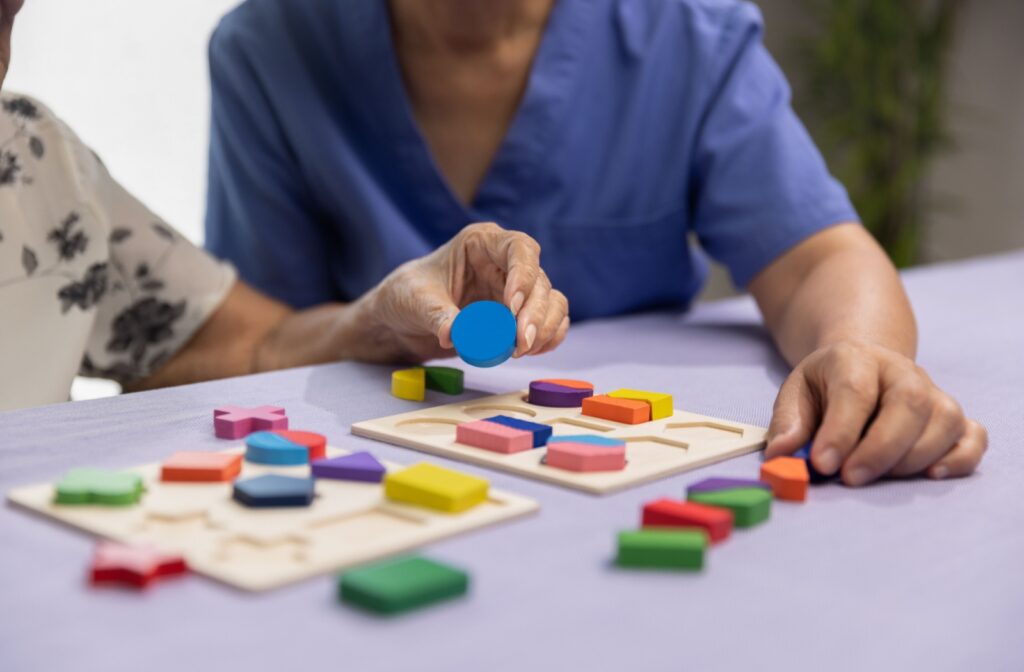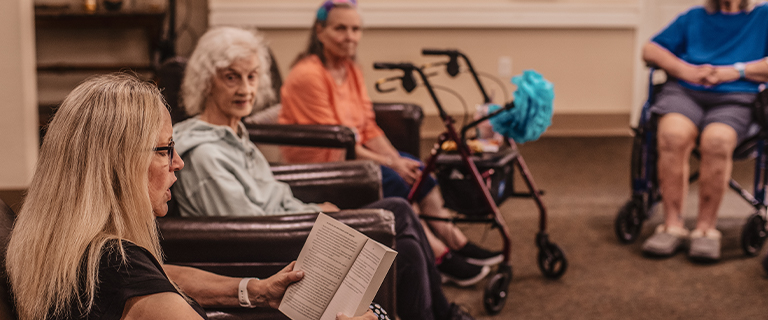Caring for a loved one with Alzheimer’s disease or dementia is a profound act of love, but it can also be a challenging and, at times, overwhelming responsibility. Memory care communities are an excellent option that can offer the support and structure your loved one needs while providing you with peace of mind.
These communities provide specialized care for people with memory issues (like Alzheimer’s or dementia) and typically feature specialized staff, 24-hour supervision, structured environments, medical monitoring, and therapeutic and engaging activities.
Whether you’re just beginning to gather information or feel it may soon be the right time for memory care, finding a community that feels like home and meets your loved one’s needs is paramount.
What is a Person-Centered Approach to Memory Care?
When exploring memory care, you’ll often hear “person-centered care.” But what does it mean? At its core, person-centered care focuses on the individual rather than the disease. This philosophy emphasizes understanding a person’s history, preferences, and unique needs, creating a personalized care plan beyond generic solutions.
For example, rather than following rigid routines, staff in memory care communities aim to adapt to residents’ rhythms and habits. If your loved one prefers late-morning showers and enjoys birdwatching, a person-centered approach would integrate these into daily life. This method encourages dignity, independence, and a sense of familiarity—key comforts for individuals with Alzheimer’s or dementia.
How Memory Care Helps People Living With Alzheimer’s Disease
Memory care communities specialize in the challenges associated with cognitive decline, offering residents a safe, structured, and supportive environment.
- Supervised environment: Residents can access secure settings that prevent wandering—a common safety concern for individuals with memory impairments.
- Therapeutic activities: Music therapy, art classes, or gardening programs are designed to stimulate cognition and reduce symptoms like agitation or confusion.
- Healthy social interaction: Structured group activities promote connection, which counteracts feelings of isolation commonly experienced by people with Alzheimer’s or dementia.
- Trained staff: Memory care staff possess specialized training in handling behavioral challenges, ensuring your loved one receives care grounded in expertise and compassion.
How to Know It’s Time for Memory Care
Determining when to move a loved one into memory care is a profoundly personal decision influenced by their specific needs and your caregiving capacity. Here are some signs it might be time to consider memory care:
- Safety concerns: Frequent wandering, leaving appliances on, or an increased likelihood of falls could signal the need for professional care.
- Increasing needs: Managing bathing, dressing, eating, and medication routines becomes difficult as dementia progresses.
- Aggression or frustration: Agitation or increased aggression in a loved one may indicate they require tailored expertise.
- Caregiver burnout: If the emotional or physical toll of providing 24/7 care impacts your health, it’s okay to seek help.
While deciding to transition to memory care is never easy, prioritizing the safety and well-being of both you and your loved one is vital.
What Is It Like Living in Memory Care?
Picture a thoughtfully designed community where every detail is crafted to make life safer, easier, and more enriching for people living with Alzheimer’s or dementia. Residents typically enjoy private or shared rooms, common areas tailored to reduce confusion, and beautiful outdoor spaces for relaxation and activities. Meals are provided, with staff ensuring proper nutrition. Daily routines are structured but flexible, incorporating programs that boost mental and emotional well-being.
Staff members build personal connections with residents, creating an environment where your loved one feels cared for and known. Families are encouraged to visit regularly, maintaining a sense of continuity and connection.
Minimum Standards You Should Expect From a Memory Care Community
Quality memory care communities meet specific guidelines to ensure residents’ safety and comfort. Here are the standards you should expect:
- Security: 24-hour monitoring to prevent wandering and assure safety.
- Cleanliness: Well-maintained rooms, dining areas, and activity spaces.
- Personalized care plans: Regular updates to care plans tailored to changing needs.
- Emergency preparedness: Staff trained in protocols for medical or environmental emergencies.
Review the community’s certification, state licensing, and inspection reports to confirm it meets these core standards.
What Are Requirements for Staffing & Training?
One of the most essential aspects of memory care is the direct care staff. Look for communities that prioritize extensive training and empathy in their hiring processes. Standards to expect include:
- Regularly trained caregivers in dementia care techniques like redirection and de-escalation.
- Minimum staff-to-resident ratios that ensure personalized attention.
- Collaborative teams that include nurses, therapists, and other specialists.
What Treatments Should Memory Care Patients Receive?

Effective treatments in memory care communities focus on enhancing quality of life. These include:
- Cognitive therapies: Activities designed to stimulate thinking and memory.
- Physical exercise: Gentle programs that promote movement and reduce restlessness.
- Medication management: Accurate administration of prescribed dementia medications.
- Behavioral interventions: Techniques tailored to minimize anxiety or aggression.
Why Is It Important To Find a Memory Care Community That Meets All Your Needs?
Transitioning to memory care should feel like a positive, restorative step for your loved one—and for you. A supportive community that understands your family’s unique needs offers peace of mind and ensures your loved one lives with dignity, safety, and joy. Parsons House Preston Hollow knows that the right memory care for your loved one makes a difference in their daily experience when they can receive the care and compassion they deserve. Contact us today to see how we can help create a second home for your loved one.



